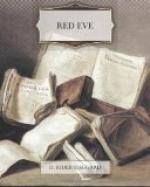Dick lifted his bow, but Hugh knocked the arrow aside ere he could loose it.
“To those who talk of death, death often draws near,” replied Clavering, crossing himself, “though I find the place well enough, seeing the hour and season.”
“Do you—do you, Sir John? Look at that sky; look at the river beneath which has turned to blood. Hark to the howl of the wind in the reeds and the cry of the birds we cannot see. Ay, and look at our shadows on the snow. Mine lies flat by a great hole, and yours rising against yonder bank is that of a hooded man with hollow eyes—Death himself as I should limn him! There, it is gone! What a fool am I, or how strong is that wine of yours! Shall we be going also?”
“Nay, here comes my son with tidings. Well, Jack, have you found your sister?” he added, addressing a dark and somewhat saturnine young man who now rode up to them from over the crest of the hollow.
“No, sir, though we have beat the marsh through and through, so that scarce an otter could have escaped us. And yet she’s here, for Thomas of Kessland caught sight of her red cloak among the reeds, and what’s more, Hugh de Cressi is with her, and Grey Dick too, for both were seen.”
“I am glad there’s a third,” said Sir John drily, “though God save me from his arrows! This Grey Dick,” he added to the Count, “is a wild, homeless half-wit whom they call Hugh de Cressi’s shadow, but the finest archer in Suffolk, with Norfolk thrown in; one who can put a shaft through every button on your doublet at fifty paces—ay, and bring down wild geese on the wing twice out of four times, for I have seen him do it with that black bow of his.”
“Indeed? Then I should like to see him shoot—at somebody else,” answered Acour, for in those days such skill was of interest to all soldiers. “Kill Hugh de Cressi if you will, friend, but spare Grey Dick; he might be useful.”
“Ay, Sir Edmund,” broke in the young man furiously, “I’ll kill him if I can catch him, the dog who dares to bring scandal on my sister’s name. Let the Saints but give me five minutes face to face with him alone, with none to help either of us, and I’ll beat him to a pulp, and hang what’s left of him upon the nearest tree to be a warning to all such puppies.”
“I note the challenge,” said Sir Edmund, “and should the chance come my way will keep the lists for you with pleasure, since whatever this Hugh may be I doubt that from his blood he’ll prove no coward. But, young sir, you must catch your puppy ere you hang him, and if he is in this marsh he must have gone to ground.”
“I think so, too, Sir Edmund; but, if so, we’ll soon start the badger. Look yonder.” And he pointed to smoke rising at several spots half a mile or more away.
“What have you done, son?” asked Sir John anxiously.
“Fired the reeds,” he said with a savage laugh, “and set men to watch that the game does not break back. Oh, have no fear, father! Red Eve will take no harm. The girl ever loved fire. Moreover, if she is there she will run to the water before it, and be caught.”




